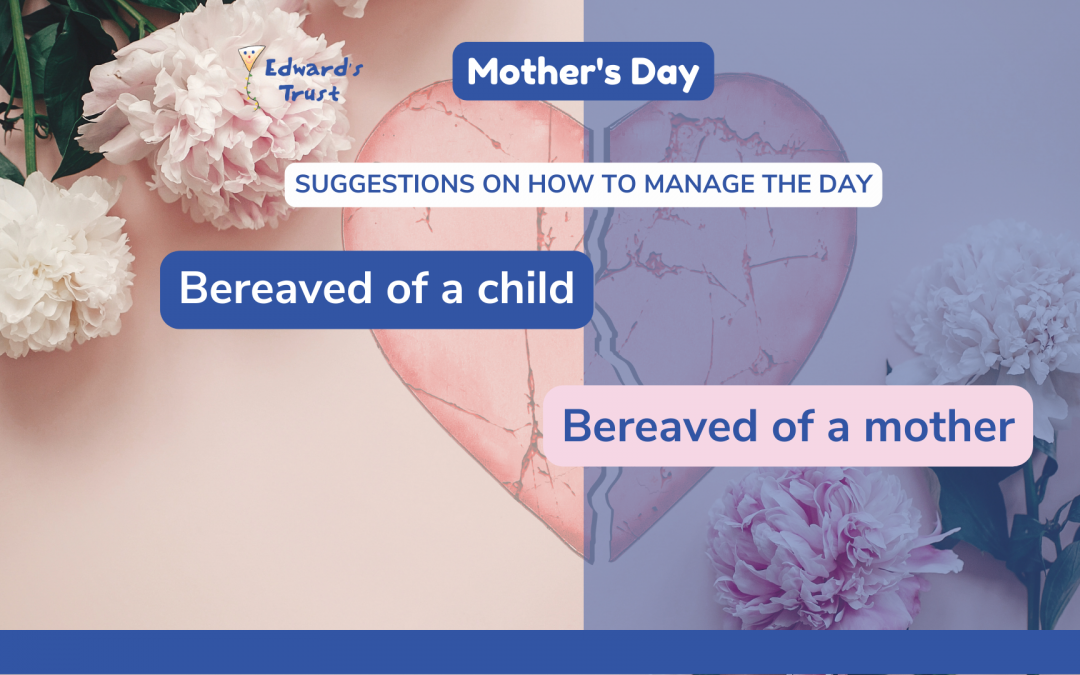Both grieving a Mum and grieving a child on Mother’s Day can be difficult so our counsellors have offered some suggestions for both of these circumstances – How to cope when bereaved of your Mum/Mom, followed by how to cope when you are bereaved of your child. We hope you find them useful.
How to cope with Mother’s Day when you are bereaved of your Mom/Mum
Losing a mother is an incredibly difficult experience, and Mother’s Day can be particularly challenging for those who are grieving however long it has been since your Mom died. You may find yourself experiencing lots of different emotions, which is completely normal. On days like these we can feel like we have very little control over how we feel. Planning something to do that pays attention to our grief may give us more of a sense of control in what seems quite scary or unknown.
Some people may find the following things useful in allowing them to reflect on their memories with their mothers and manage the day:
- Honour her memory: Consider creating a special tribute to your mother, such as:
- Light a candle, sit quietly and take time to remember something about her. This can be anything from the way she wore her hair to a favourite outing you had, nothing is too small.
- Tie your Mother’s Day card or a special message to a helium balloon and let it soar into the sky.
- Plant a tree, some bulbs or seeds in a place that holds special memories of your Mom, if you are unsure of a place, maybe do this somewhere you walk regularly, or in your own garden.
- Have her favourite meal or pudding. Maybe try baking?
- Listen to her favourite music or make a playlist dedicated to you and her.
- Make a memory box in which to keep things that remind you of her – photos, shells, holiday snaps, glasses, silly earrings etc.
- Make or buy a new frame for your favourite photograph of her or make an album with memories of your favourite times together
- Post a photo and memory online on our Edward’s Trust Mother’s Day dedication page: https://edwardstrust.memorypage.org/mothersday23
- Ask your family members for their memories of your Mom.
- Write her a letter or a poem or a song. Maybe you could start with something like ‘If you came back for just 5 minutes, I’d tell you….
It is important to not feel any pressure on the length of time you spend on any activity that you decide to do. Please remember to balance your time of reflection with looking after yourself and your loved ones around you too.
2. Reach out for support: It can be helpful to talk to friends or family members who have gone through a similar experience or to seek support from your counsellor at Edward’s Trust.
3. Take care of yourself: Make sure to take care of your physical and emotional needs by getting enough rest, eating well, and engaging in activities that bring you comfort and joy.
4. Plan ahead: Decide ahead of time how you want to spend Mother’s Day, and consider avoiding activities that might be triggering for you. You might also want to plan a special activity to honour your mother as suggested above.
5. Be gentle with yourself: Grief is a process, and it’s important to be patient and compassionate with yourself as you navigate your feelings. Remember that it’s okay to feel a range of emotions and to take the time you need to heal.
You can print a downloadable handout with all these ideas here
How to cope with Mother’s Day when you are bereaved of your child
This may be the first or 20th Mother’s Day without your child. You don’t know how you will feel on this Mother’s Day. Let the experience happen. Your grief will take shape and change at times. Grief is now part of you and will come in different ways.
Thinking about Mother’s Day may be worse than the day itself. Try not to worry about the day, but here are some strategies that may help:
Acknowledge your feelings: It’s important to recognise and accept the emotions you’re experiencing, whether it’s sadness, anger, or a sense of emptiness. Allow yourself to feel your emotions and don’t try to suppress them.
Seek support: Lean on your support system, whether it’s friends, family, people who have been through a similar experience, or your Edward’s Trust counsellor. You don’t have to go through this alone, and it’s okay to ask for help.
Remember your child: Don’t be frightened or put off from talking about your child. Say their name and remember your child in your own way. You could light a candle, visit their grave, or create a special memorial. Celebrate their life and the love that you shared.
Be gentle with yourself: It’s okay to not feel okay. Give yourself permission to take a break from activities or events that feel overwhelming or triggering.
Practice self-care: Take care of yourself physically and emotionally. This could involve exercise, eating well, getting enough sleep, or engaging in activities that bring you joy.
Connect with others who understand: There may be online communities or local support groups for parents who have lost children. Connecting with others who understand what you’re going through can be comforting and validating.
Remember that grief is a personal journey, and there is no right or wrong way to cope with it. Be patient and compassionate with yourself as you navigate this difficult time.
Memories will be with you forever, bonds will never be broken.

